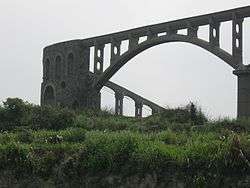Heshan, Guangdong
Heshan, formerly romanized as Hokshan, is a county-level city of Jiangmen City in the southern part of Guangdong Province, China with a total land area of 1,108.3 square kilometres (427.9 sq mi) and a population of 360,000. If migrants this figure rises to around 550,000 persons residing within the city's borders. There are approximately 360,000 people of Heshan origin or descent living in other parts of the world.
Situated about 60 kilometres (37 mi) south west of the provincial capital, Guangzhou, Heshan occupies a strategic location on the Pearl River Delta, commanding the northern gateway to Jiangmen's five prefectures. Along the opposite bank of the same river, lie the two municipalities of Nanhai and Shunde. Heshan is around one hour from Hong Kong and Macau by road. The city's harbour can accommodate vessels of up to 3,000 long tons (3,050 t). Ships ply from here to Hong Kong directly.
Name
Heshan—one of several places in China whose name means "Mount Crane"—takes its name from a nearby mountain thought to resemble the shape of the bird. The spelling Heshan derives from the pinyin romanization of the name's Mandarin pronunciation. The Postal Map spelling Hokshan was a combination of the local Cantonese pronunciation of the first character and the Mandarin pronunciation of the second. Heshan has also been romanized as Ho Shan[1] and Ho-shan.[2]
History
Heshan was made a prefecture in 1732 during the reign of the Yongzheng Emperor of the Qing. By the 19th century, Heshan County made up part of the commandery of Zhaoqing.[1] In 1993, it was promoted to a county-level city.
Administrative divisions
Heshan Municipality administers ten towns:
| Name | Chinese (S) | Hanyu Pinyin | Population (2010)[3] |
|---|---|---|---|
| Shaping Subdistrict | 沙坪街道 | Shāpíng Jiēdào | 197,155 |
| Longkou Town | 龙口镇 | Lóngkǒu Zhèn | 36,625 |
| Yayao Town | 雅瑶镇 | Yǎyáo Zhèn | 38,851 |
| Gulao Town | 古劳镇 | Gǔláo Zhèn | 35,606 |
| Taoyuan Town | 桃源镇 | Táoyuán Zhèn | 25,902 |
| Hecheng Town | 鹤城镇 | Hèchéng Zhèn | 32,170 |
| Gonghe Town | 共和镇 | Gònghé Zhèn | 41,338 |
| Zhishan Town | 址山镇 | Zhǐshān Zhèn | 32,009 |
| Zhaiwu Town | 宅梧镇 | Zháiwú Zhèn | 26,254 |
| Yunxiang Town | 云乡镇 | Yúnxiāng Zhèn | 12,453 |
| Shuanghe Town | 双合镇 | Shuānghé Zhèn | 16,575 |
Industry
Heshan is located at the center of one of China's largest furniture producing areas, with approximately 10% of the worlds furniture produced on its outskirts.
Culture
Heshan is the birthplace of the Southern dance style known as the Hok San lion dance.
Notable individuals
Heshan is the birthplace of NBA player Yi Jianlian.
Singaporean community leader and businessman, Yam Kok Yuen (任國源), was born in Ha Lok Village (下六村) in Heshan. He was a founding member of the Malayan Chinese Association in Singapore and was Chairman of the Nanyang Hok San Association and Siew Heng Association in the 1950s. His grandson, Alex Yam, is a current Member of Parliament in Singapore.
References
Citations
- 1 2 Bolton & al. (1941), p. 262.
- ↑ Encyclopaedia Britannica, 9th ed. (1878), Vol. V, "China".
- ↑ shi, Guo wu yuan ren kou pu cha ban gong; council, Guo jia tong ji ju ren kou he jiu ye tong ji si bian = Tabulation on the 2010 population census of the people's republic of China by township / compiled by Population census office under the state; population, Department of; statistics, employment statistics national bureau of (2012). Zhongguo 2010 nian ren kou pu cha fen xiang, zhen, jie dao zi liao (Di 1 ban. ed.). Beijing Shi: Zhongguo tong ji chu ban she. ISBN 978-7-5037-6660-2.
Bibliography
- Bolton, Kingsley; et al. (1941), Triad Societies, Vol. 5, Abingdon: Routledge, reprinted 2000.

.png)

